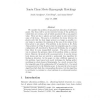Free Online Productivity Tools
i2Speak
i2Symbol
i2OCR
iTex2Img
iWeb2Print
iWeb2Shot
i2Type
iPdf2Split
iPdf2Merge
i2Bopomofo
i2Arabic
i2Style
i2Image
i2PDF
iLatex2Rtf
Sci2ools
114
click to vote
APPROX
2008
Springer
2008
Springer
Santa Claus Meets Hypergraph Matchings
We consider the problem of max-min fair allocation of indivisible goods. Our focus will be on the restricted version of the problem in which there are m items, each of which associated with a non-negative value. There are also n players and each player is only interested in some of the items. The goal is to distribute the items between the players such that the least happy person is as happy as possible, i.e. one wants to maximize the minimum of the sum of the values of the items given to any player. This problem is also known as the Santa Claus problem [3]. Feige [9] proves that the integrality gap of a certain configuration LP, described by Bansal and Sviridenko [3], is bounded from below by some (unspecified) constant. This gives an efficient way to estimate the optimum value of the problem within a constant factor. However, the proof in [9] is nonconstructive: it uses the Lovasz local lemma and does not provide a polynomial time algorithm for finding an allocation. In this paper, ...
| Added | 12 Oct 2010 |
| Updated | 12 Oct 2010 |
| Type | Conference |
| Year | 2008 |
| Where | APPROX |
| Authors | Arash Asadpour, Uriel Feige, Amin Saberi |
Comments (0)

